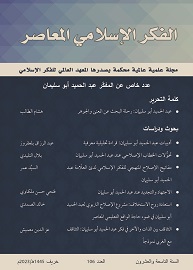Abstract
This article offers a cognitive inquiry into the overall intellectual productivity of AbdulHamid AbuSulayman. The advantage of this type of inquiry is that it is based on the methodology of thinking with cognitive models, specifically conceptual ones. The study employs this methodology to understand the fields of knowledge that AbuSulayman engaged with, and the intellectual reforms and practical application in education he sought to achieve in order to remedy the Muslim psyche. The study attempts to elucidate the relationship between values, intellectual reform, and civilizational development in AbuSulayman’s thought, and it contends that these are interdependent in his reform project. The study demonstrates how AbuSulayman is able to develop a viable strategy of reform to address the challenges facing the Ummah.

This work is licensed under a Creative Commons Attribution-NonCommercial-NoDerivatives 4.0 International License.
Copyright (c) 2023 المعهد العالمي للفكر الإسلامي





